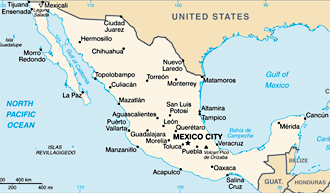The entire police force in Mexico’s port city of Veracruz was dissolved on Wednesday, as the national army and navy took over security responsibilities.
The disbanding of 800 police officers and 300 administrative employees is part of an effort to root out police corruption and start from scratch in the state’s largest city. Mexico’s drug cartels have informants and protection from corrupt law enforcement throughout the country.
 Thousands of armed Marines have barricaded police headquarters and Navy attack helicopters flew above the city in the latest incarnation of the U.S. drug war, in which Washington pressures the Mexican government to employ a hyper-militarized approach to the drug gangs.
Thousands of armed Marines have barricaded police headquarters and Navy attack helicopters flew above the city in the latest incarnation of the U.S. drug war, in which Washington pressures the Mexican government to employ a hyper-militarized approach to the drug gangs.
U.S. and Mexican authorities have recently been congratulating themselves on a major drug bust on the Sinaloa cartel that led to 203 arrests, the seizure of more than 1,200 pounds of narcotics, $7.8 million in drug cash, and more. But these drug busts typically are a benefit to rival drug gangs who move in quick to fill the hole in the market. It never stops the flow of drugs or harms the cartels in the long run.
Mexico’s over-reliance on harsh law enforcement and militaristic approaches to the drug war has resulted in a dramatic increase in violence and an unaccountable police and military force that is responsible for widespread human rights violations, all supported by the U.S.
“Instead of reducing violence, Mexico’s ‘war on drugs’ has resulted in a dramatic increase in killings, torture, and other appalling abuses by security forces, which only make the climate of lawlessness and fear worse in many parts of the country,” said José Miguel Vivanco of Human Rights Watch. What’s more, claimed the report, is that most of these crimes are committed with impunity.
President Calderon’s policy to deploy 50,000 Mexican troops and thousands more federal police officers – forces that are trained by the United States – appears only to have increased the violence, which has left more than 46,000 dead in recent years.
“George W. Bush backed Calderón’s militarization with a $1.8 billion package of helicopters, police training, and intelligence cooperation,” wrote The New Yorker’sSteve Coll recently. “Obama has continued the program” and “has reportedly sent drones to help Mexico track cartel leaders and traffickers.”
Meanwhile, the presidents of the Latin American countries attending the eighth summit meeting of the Tuxtla System for Dialogue this approved a formal request to the United States which included suggestions of market alternatives to the current militarized approach.
The declaration urged the U.S. “to explore the possible alternatives to eliminate the exorbinant profits of the criminals, including regulatory or market oriented options to this end. Thus, the transit of substances that continue provoking high levels of crime and violence in Latin American and Caribbean nations will be avoided.” It also included a demand that the U.S. stop the transit of arms to the criminals which only provokes more death and violence.
But the U.S. has spurned previous such requests and policy is firmly entrenched in the status quo. A succession of failures has yet to change the preferred options in the U.S.


